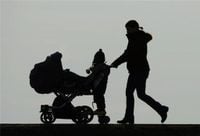In a significant shift for Germany's pension system, the government is set to enhance the 'Mütterrente' or mother's pension, promising greater financial support for millions of parents, particularly those with children born before 1992. This initiative, part of a broader pension reform, aims to rectify longstanding disparities in pension benefits based on the year of birth of children.
Currently, the pension system recognizes three years of child-rearing time and awards three pension points for each child born after 1992. However, for children born before this date, only 2.5 years and 2.5 pension points are acknowledged. The coalition government, consisting of the Union and SPD, intends to amend this by increasing the recognition for earlier-born children to three years and three pension points. This adjustment is a part of their coalition agreement and reflects a commitment to equal treatment for all mothers.
For instance, Elvira S., who has three children born between 1982 and 1986, currently receives 7.5 pension points, translating to approximately 306 euros per month. After the planned modifications, she would gain an additional 1.5 points, equating to around 61 euros more, bringing her total monthly pension to about 367 euros. This increase may take effect as early as January 2026, although the timeline remains uncertain.
Petra S., who returned to part-time work earning 1800 euros monthly after her child's second birthday, benefits from both her job and child-rearing time. She accumulates about 1.43 pension points annually, which corresponds to roughly 58 euros monthly. However, it is important to note that the maximum pension points credited in 2025 will be close to 80 euros.
In addition to the pension enhancements, the government is also introducing the 'Kinderberücksichtigungszeit' (KBZ), which applies after a child's third birthday and extends until the child turns ten. During this period, parents can benefit from a 50% increase in their income from part-time work for pension calculations, up to a maximum of one point per year. For example, Deniz S., an IT specialist earning 2500 euros gross monthly, would see her pension points rise from 0.6 to 0.9 annually during the KBZ, potentially adding 85 euros to her pension over seven years.
Despite these positive changes, the expansion of the 'Mütterrente' has faced criticism, particularly regarding its financing. Economists have raised concerns that the additional costs, estimated at five billion euros annually, will not be covered by employee contributions but rather through tax revenue, marking it as a societal responsibility. Gundula Roßbach, President of the German Pension Insurance, has called the expansion a "very expensive redistribution," emphasizing the need for a sustainable financial plan.
New Finance Minister Lars Klingbeil is now tasked with addressing these financial concerns. Economists like Jens Südekum from the University of Düsseldorf suggest that Klingbeil must clearly communicate to his coalition partners that there may not be sufficient funds for all desired projects, including the 'Mütterrente' expansion.
Friedrich Heinemann, head of public finance at the Leibniz Centre for European Economic Research, has urged Klingbeil to implement strict measures to control social spending, as currently, one in every four euros in the federal budget is allocated to the pension system. He warns that without significant cost containment, the financial challenges will persist, especially in light of the recent changes to the debt rules and the additional financial burdens they may impose.
Moreover, the proposed pension reform not only aims to increase benefits for parents but also offers the possibility of earlier retirement for those who have raised children. This could allow parents, especially mothers, to retire without financial penalties, provided they meet certain conditions regarding their insurance history.
It is crucial for parents to understand that while the government plans these enhancements, they must actively apply for the benefits. Since 1986, the birth of children has been automatically noted in pension accounts, but parents must explicitly request recognition of their child-rearing periods when applying for retirement. Gundula Sennewald from the Deutsche Rentenversicherung Bund emphasizes the importance of this application process, stating, "Have you raised children in their first ten years for whom the child-rearing periods have not been fully credited?" This inquiry is essential for parents to secure their rightful benefits.
Additionally, the pension rights associated with child-rearing time are allocated to one parent, typically the mother. However, arrangements can be made for fathers to share these rights. Parents can alternate the acknowledgment of child-rearing time, but early consultation with the pension insurance is recommended to ensure proper crediting.
As the planned reforms move forward, many parents are hopeful for the changes that promise greater financial security in retirement. The adjustments to the 'Mütterrente' represent a significant acknowledgment of the contributions made by parents, particularly mothers, in raising the next generation. However, the path to implementation will require careful navigation of financial realities and a commitment to sustainable funding strategies.
With the proposed changes, millions of parents could see a substantial increase in their pensions, enhancing their quality of life as they age. As the dialogue continues, the government must balance the need for increased support with fiscal responsibility, ensuring that the benefits reach those who need them most without jeopardizing the overall stability of the pension system.




